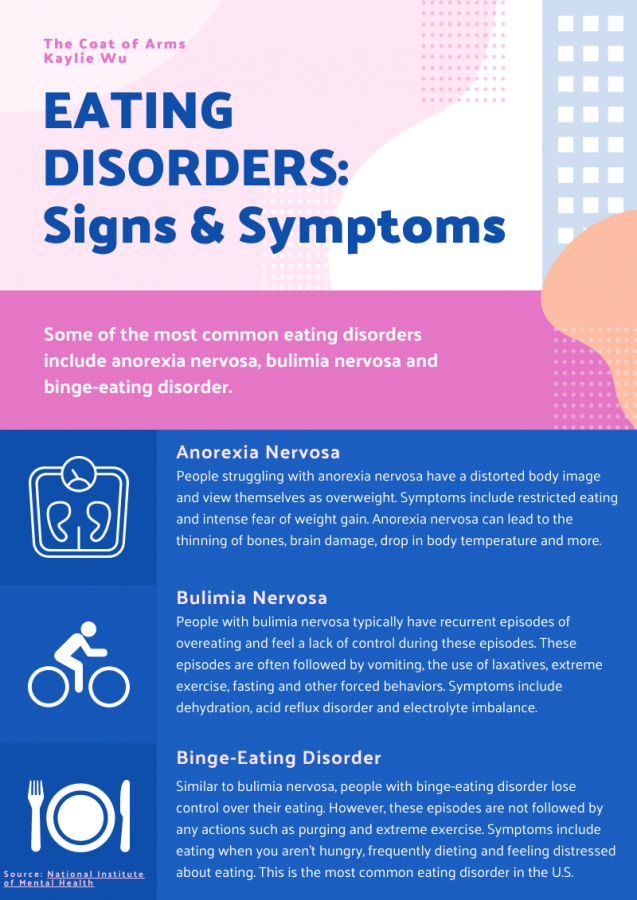How the COVID-19 Pandemic Altered My Perspective on Body Image
Different eating disorders include certain signs and symptoms. Scroll down to see a larger version of this image. Infographic by Kaylie Wu.
March 2, 2021
When the COVID-19 pandemic hit, I had no idea how different my life would become. I didn’t expect classes to remain online for the rest of the school year, and I certainly didn’t expect the normalization of masks. However, I was most surprised by how the pandemic impacted my relationship with food.
Before the pandemic, I had an unproblematic relationship with food. I ate three meals a day, and I never worried about what I was eating. But, when the first shelter-in-place order began, that quickly changed. I started to eat out of boredom because I had nothing better to do. At first, I was unaware of my changing eating habits, but social media forced me to confront this new habit. On my TikTok For You page, I watched a few videos of girls sharing their workout routines and inspiring others to “lose their quarantine bodies” and “have a quarantine glow-up.” I saved these to my camera roll and planned on working out the following day.
However, saving these videos altered my For You page’s algorithm. Weight loss-related videos soon replaced dances and lighthearted skits. My For You page consisted of daily weight loss hacks, workout motivation and meal plans. These endless videos plagued both my screen and my mind, convincing me I wouldn’t be happy until I lost the few pounds I’d gained during shelter-in-place. I even eventually started experimenting with my For You page’s suggested weight loss “hacks,” such as taking shots of apple cider vinegar every day. However, I did this carelessly; I completely ignored how these tricks would harm my body in the long run. For instance, according to Harvard Medical School, the acid in apple cider vinegar can lead to low potassium levels, tooth erosion and stomach issues.
To make the matter even worse, my YouTube Recommended section also started to suggest weight loss videos. By May 2020, losing quarantine weight became a popular trend all over social media, not just on my TikTok For You page. It seemed as if the entire world had rapidly shifted from making whipped coffees and mug cakes to wanting to lose body fat and burn hundreds of calories. I soon learned that these social media trends affected many of my friends as well, whose intense workout challenges heightened my own desire to participate. As a result, I committed to a three-week Chloe Ting workout program. Even though it’s important to get exercise, I wasn’t doing it for the right reasons. I was working out for the sole reason of losing unwanted weight, not because I wanted to stay healthy. And although I worked out daily for weeks, I was annoyed by my lack of results.
In July 2020, my struggles with weight intensified. Halfway through the month, I found out I had been exposed to COVID-19, so I quarantined in my bedroom to prevent potential spread to my family. During this short time period, I decided working out wasn’t effective or satisfying enough, so I went from eating three meals a day plus snacks to eating fewer than 200 calories a day. To put things into perspective, the average toddler should eat at least 1,000 calories per day, according to a nutrition guide from KidsHealth.
Even when I tested negative for COVID-19 and didn’t need to quarantine anymore, these unhealthy eating habits continued. Instead of returning to a healthy eating pattern, the situation only got worse and worse. Because I was barely eating any food, I found myself constantly exhausted, and I reached a point where I didn’t have enough energy to exercise. I was too tired to even get out of my bed. Every time I stood up, my head filled with dizziness and discomfort. But I refused to make any changes; my mind was still too fixated on meeting social media’s standards of being “skinny.” During the months of July and August, I constantly thought about all my favorite foods that I wanted to enjoy but wouldn’t allow myself to. I began watching food-related TV shows on Netflix such as Sugar Rush, which made me even hungrier. To prevent slipping up and eating anything I considered unhealthy, I created a journal where I outlined how I would limit my calorie intake each week.
By the end of August 2020, my parents noticed I was consistently skipping meals. My father consulted many doctors over the phone, all of whom instructed him to take me to the hospital as soon as possible. I insisted to my parents that this wasn’t necessary, but my opinion didn’t matter to them as much as my safety.
My mother drove me to the hospital that week, and I had seven different blood tests taken. It wasn’t until I saw my results that I finally accepted the severity of my eating disorder. I was shocked by how threatening the numbers were, and they ultimately motivated me to make changes in my eating habits. My goals switched from losing weight to recovering. I had no desire for hospital-based treatment, which would have separated me from my family for over three weeks and forced me to stay in the hospital. To avoid this, I spent the next few weeks eating and working on what I had previously imagined as my worst nightmare: gaining a healthy amount of weight. Thankfully, with my family’s help, I slowly reversed the harm my eating disorder had caused and returned to my pre-pandemic eating habits.
Looking back now, I wish I had known about the risks of eating disorders before making the rash decision to cut calories and monitor my eating. Many videos I’ve seen on TikTok glorify eating disorders, but they exclude all of the negative components such as constant fatigue and headaches. This false glorification on social media is just one of many factors that contribute to the overwhelmingly high number of people battling with body image. According to the Melrose Center, an eating disorder treatment center in St. Louis Park, Minn., around 50% of Americans are unhappy with their current weight. Another study from The National Association of Anorexia Nervosa and Associated Disorders concluded that 9% of the U.S. population will have an eating disorder in their lifetime. Many people worldwide struggle with food and body image. Still, there are many ways to seek help, such as meeting with a nutritionist or therapist, rather than resorting to unhealthy eating habits.
In addition, the social media world should strive to become a less toxic environment. TikTok accounts that post videos about “how to be healthy and skinny” need to be more mindful of the consequences, such as damage to other people’s body image.
I also want to emphasize why eating disorder awareness is crucial: people need to understand that there is a big difference between a healthy, balanced diet and a restrictive one. According to dietitian Rachael McBride, what might start out as a minor calorie deficit and harmless exercise can quickly evolve into an eating disorder or disordered eating.
A few resources to learn more about eating disorders include the National Institute of Mental Health and Bulimia.com, a subsidiary of American Addiction Centers.




